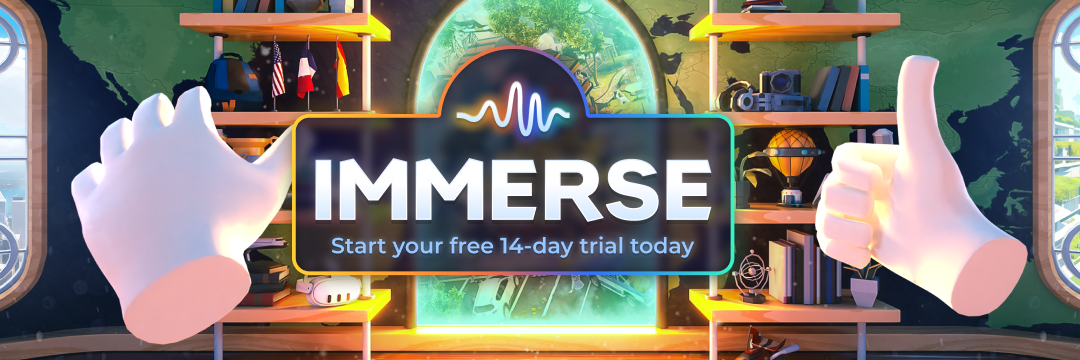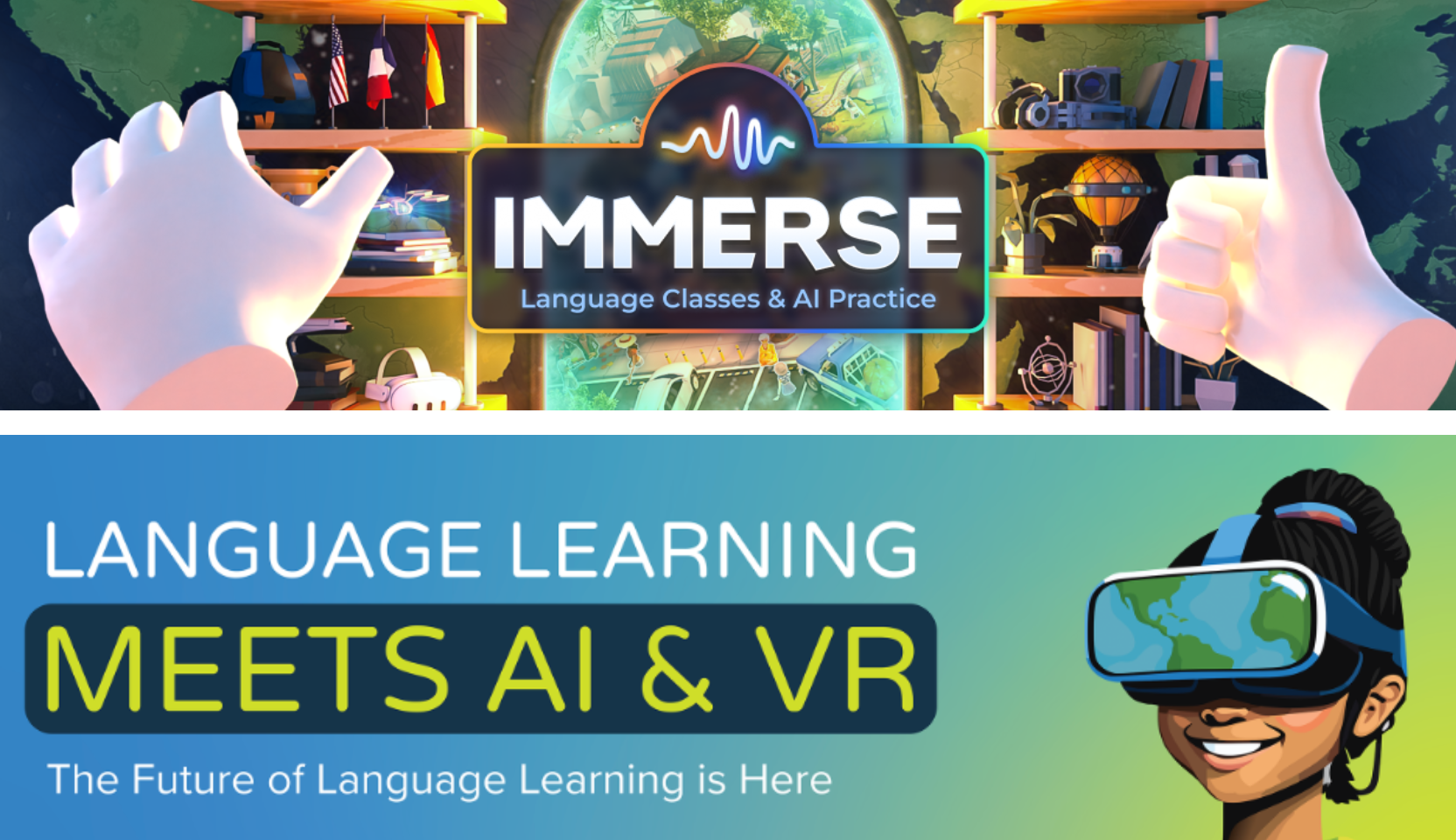Last Updated: February 1, 2024
Immerse insights:
- Immerse lets you work with language in context and learn a language the way it's actually spoken
- Immerse makes language learning social instead of scary
- VR is one of the most effective ways to learn new vocabulary, pronunciation, grammar, speaking, and listening
- Research shows learners can make years’ worth of learning gains in months using Immerse
The best way to learn a new language
Let’s be real.
Being immersed in VR is fun and exciting. Technology has come a long way and putting on a VR headset for the first time can be truly mind blowing.
But VR for language learning? You may wonder if all the bells and whistles are just for show. Does VR immersion for language learning really help you improve your language skills?
The short answer is yes.
VR language apps that allow for interaction with objects, the environment, and other people have been shown to facilitate language learning much better than traditional classroom settings or mobile apps.

What makes VR such a powerful language learning tool?
VR has several benefits, or affordances as researchers call them, that are advantageous for language learning. These features are what give virtual reality the power to transform your language learning experience.
Learning language in context
According to the research on VR language learning, VR has unprecedented potential to offer contextualized, culturally relevant learning and to virtually transport students to destinations that they cannot physically visit.
This means you can learn how to order your favorite meal at our Immerse restaurant or how to state your opinion while in the debate room!
All this matters, because learning vocabulary in a meaningful context leads to better learning.
VR also promotes social interaction and social language learning
Most language learning apps give you a series of meaningless drill-based activities to do by yourself.
You don’t even use the language to interact with others.
But with Immerse, you get to converse with other Members and do activities led by our expert language Guides in more than 30 realistic virtual environments.

This is key, because researchers say social interaction is a major driver of successful language learning.
Think about it this way – you can’t learn a language in a vacuum on your own.
You can learn vocabulary and grammar rules by studying independently, but to develop the skills to string them together fluently you need to be able to practice speaking with others. This is why live virtual language classes and conversation events are the core of Immerse.
VR strengthens your motivation to practice speaking
Studies have also shown that VR, experienced with a VR headset or computer screen, has a positive influence on how motivated and engaged you feel while learning.
The importance of this should not be underestimated, since these so-called affective factors are necessary for reaching fluency.
And let’s face it, learning a language is hard.
It requires long-term dedication, and it can be really intimidating to take risks in a language when you are not fully confident in your speaking abilities.
VR has been shown to help with this.
Indeed, many studies have found that language learners are more motivated and less anxious in VR than in more traditional classroom settings.

This has been attributed to VR’s fun, game-like qualities and to the fact that learners’ identities are concealed by avatars. In fact, using an avatar to learn a language has a number of benefits.
Does VR actually positively influence learning?
This means that you are setting yourself up for optimum success by becoming an Immerse member.
For the fraction of the cost of a tutor or language classes, Immerse membership provides you with unlimited access to live VR language classes and conversation events led by expert instructors, AI practice scenes, and language games. Try it for 14 days for free and see if it isn’t the most fun and effective language learning experience you’ve ever had.
References:
Chen, YL. (2016). The Effects of Virtual Reality Learning Environment on Student Cognitive and Linguistic Development. Asia-Pacific Edu Res 25, 637–646. https://doi.org/10.1007/s40299-016-0293-2
Huang, X., Zou, D., Cheng, G., & Xie, H. (2021). A systematic review of AR and VR enhanced language learning. Sustainability, 13(9), 4639. https://doi.org/10.3390/su13094639
Li, P., & Jeong, H. (2020). The social brain of language: grounding second language learning in social interaction. npj Sci. Learn. 5, 8. https://doi.org/10.1038/s41539-020-0068-7
Parmaxi, A. (2023). Virtual reality in language learning: A systematic review and implications for research and practice. Interactive learning environments, 31(1), 172-184. https://doi.org/10.1080/10494820.2020.1765392
Sataka, Y., Yamamoto, S., & Obari, H. (2021). The effects of remote VR English lessons in the corona era. ASIATESL 2021 Conference. Online.
Thrasher, T. (2022). The Impact of Virtual Reality on L2 French Learners’ Language Anxiety and Oral Comprehensibility: An Exploratory Study. CALICO Journal, 39(2), 219–238. https://doi.org/10.1558/cj.42198


Tricia Thrasher


.png)



.png)





